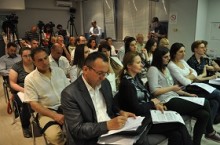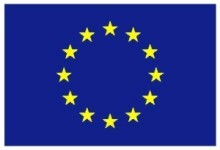28. 05. 2014
ANEM Roundtable "Role of the Media in Fighting Corruption"

The roundtable was organized as part of the project "Illustrated Glossary of Corruption" implemented by ANEM, in partnership with the Anti-Corruption Agency, and financed by the European Union.
The goal of the event was to foster discussion on the role of the media in preventing and fighting corruption, on the conditions needed for the media to successfully fulfill this role, and on the improvement of cooperation among three important actors - media, non-governmental sector and institutions - in solving the problem of corruption.
This round table is the final activity on the project the main goal of which is to contribute to a more efficient prevention and fight against corruption by a more active inclusion of citizens and the media in the process.
The event was opened by ANEM president Milorad Tadić who presented the ANEM project "Illustrated Glossary of Corruption" and the objectives of the roundtable.
The first session was dedicated to the fight against corruption and the prevention of corruption. It was moderated by Zlatko Minić of Transparency Serbia, who in his opening remarks said that the fight against corruption in Serbia is reduced to repression, but also that the initiated prosecution of corrupt activities is mainly not completed. He said that prevention, which is the only approach that can yield essential results, is neglected. It is necessary that all elements of society participate in the prevention of corruption: competent bodies, independent institutions, civil society, media, and the economy, said Minić and stressed the necessity of their mutual cooperation, especially between the media and civil society. However, to achieve progress in the fight against corruption, conditions need to be changed because the existing ones are not adequate, said Minić. Prof. Vladimir Goati, president of Transparency Serbia, said that we can distinguish between systemic corruption, which is political, and the so-called petty corruption that is present in the daily life of citizens and in their interaction with the public sector. He said that, according to the corruption indexes, Serbia is a country where this phenomenon is deeply rooted in the system. In his view, systemic corruption, which is generated by political parties, is a bigger problem than petty corruption. He said that it is difficult to expect that a comprehensive control of the executive branch of government corruption-wise can be done internally and that it is essential that media and the civil society constantly apply pressure on the authorities. Zlata Đordjević, Deputy President of the Anti-Corruption Agency Board, said that the media are crucial in the fight against corruption because their reporting forces the authorities to fully investigate all cases of corruption. She also argued that media play an important role in educating citizens and that ANEM project "Illustrated Glossary of Corruption" is therefore very important.
The second session "Media and the fight against corruption - the role of the media and the required conditions for media to perform this role" was opened by moderator Nedim Sejdinović of the Independent Journalists' Association of Vojvodina (NDNV), who said that the role of the media is indispensable in the fight against corruption as it can fulfill multiple functions: it can apply constant pressure on the Government to meet its anti-corruption programs and the promises; it can educate citizens about the need for transparency of state bodies, as well as about the place and the role of institutions and organizations in the fight against corruption; it can act preventively, creating an environment and a value system in which corruption will not be socially desirable; it can and should establish partnerships with institutions and organizations involved in the fight against corruption; it can have an educational function in relation to various social strata and can emphasize the responsibility of citizens for corruption, activating various social strata to engage in the fight against corruption. Vukašin Obradović, president of the Independent Journalists' Association of Serbia (NUNS), agreed that the media play an important role in fighting corruption, but he pointed out that a significant problem for realization of this role is non-transparent ownership of media, as well as non-transparent media financing from the state budget. He drew attention to the role of the media to point out systemic failures in the society and disorders that lead to corruption. He also said that the withdrawal of the state from media ownership will substantially enhance the role of the media in the fight against corruption, and therefore it is important to adopt a new set of media laws which should regulate the withdrawal of the state form media ownership. Zoran Sekulić, president of the Managing Board of the Association of Media, said that the awareness about the protection of public interest is a prerequisite for media to successfully engage in the fight against corruption, and that this awareness must exist among journalists, but also among media owners who have to provide conditions for journalists to work freely. Sekulić pointed out that the issues of transparency of media ownership and media funding must be resolved and that he has an impression that the new media laws will not fully resolve these issues. Milorad Tadić, president of the Association of Independent Electronic Media (ANEM), said that media operate in very difficult conditions, that they are to a large extent dependent on state aid, and that publicly and privately owned media have an unequal status. According to Tadić, this is the reason why media cannot fulfill their role of government controllers.
The introduction to the third session, which was focused on the cooperation between media, NGOs, and relevant authorities in the fight against corruption, was provided by the moderator Nemanja Nenadić of Transparency Serbia, who emphasized the importance of cooperation between these stakeholders, noting that this cooperation is not at a high level presently. Rodoljub Sabić, the Commissioner for Information of Public Importance and Personal Data Protection, said that it is extremely discouraging that citizens see the institution of the Commissioner as the greatest means for fighting corruption, although some other authorities have greater competence in this area. He also said that he submitted several months ago a report on compliance with the laws by the public companies to the Serbian Assembly, but that the document has not yet been reviewed by the Assembly, and added that it is worrying that the report had very little media coverage. Veran Matic, editor-in-chief of B92 news program, said that media are in a difficult financial situation, that the market dictates the programming content, and that as of year 2000 onwards there is a visible trend whereby the share of commercial content is increasing while the share of quality news program is on a decrease. Those media which dare to seriously report on a variety of social problems, including corruption, suffer adverse consequences, Matić pointed out. He also stressed that the media plays an important role in fighting corruption, but the role of the judiciary is the key one in that process. Dubravka Filipovski, member of the Serbian branch of the Global Organization of Parliamentarians Against Corruption (GOPAC), presented the activities of this branch of the informal network of parliamentarians.
After the discussion, during the concluding part of the roundtable, the following conclusions and recommendations were formulated:
- It is necessary to represent corruption as an undesirable form of behavior through continuous education and promotion of activities within the fight against corruption.
- It is necessary to find a systemic and long-term solution for the problem of corruption.
- The legal framework pertaining to corruption must be predictable, clear, and enforceable, and the civil society and the media should take the role of the true guardians of the public interest.
- A better understanding of the competencies and functions of state bodies involved in the fight against corruption is needed as is objective reporting about their activities.
- Prevention must take precedence over repression.
- It is necessary to constantly strengthen capacities of independent institutions involved in the fight against corruption.
- It is essential to create an enabling environment for free and objective reporting about the problem of corruption.
- State bodies, the media and the civil society must find a way to cooperate even in the existing conditions, but it is important to work on the improvement of conditions for this cooperation, for which the willingness of all three parties is necessary.
- Cooperation between civil society and the media is important for solving the problem of corruption. Civil society, owing to its expertise, can help the media by identifying corruption, its causes, and offering a solution for this problem.
- The media should point out corruption, identify the sources and forms of corruption, and exercise pressure on the relevant authorities.

The contents of this text are the sole responsibility of ANEM and can in no way be taken to reflect the views and stands of the European Union.
-
PHOTO: MC Belgrade
-
PHOTO: MC Belgrade
-
PHOTO: MC Belgrade
-
PHOTO: MC Belgrade
-
PHOTO: MC Belgrade
-
PHOTO: MC Belgrade
-
PHOTO: MC Belgrade
-
PHOTO: MC Belgrade
-
PHOTO: MC Belgrade
-
PHOTO: MC Belgrade
-
PHOTO: MC Belgrade
-
PHOTO: MC Belgrade
-
PHOTO: MC Belgrade
-
PHOTO: MC Belgrade
-
No comments on this topic.
.jpg?thumbId=1917&fileSize=7182&contentType=image/jpeg&lastModified=1401303882000)
.jpg?thumbId=1918&fileSize=6599&contentType=image/jpeg&lastModified=1401303933000)
.jpg?thumbId=1919&fileSize=8171&contentType=image/jpeg&lastModified=1401303964000)
.jpg?thumbId=1920&fileSize=6701&contentType=image/jpeg&lastModified=1401303992000)
.jpg?thumbId=1921&fileSize=7337&contentType=image/jpeg&lastModified=1401304025000)
.jpg?thumbId=1922&fileSize=7411&contentType=image/jpeg&lastModified=1401304055000)
.jpg?thumbId=1923&fileSize=6225&contentType=image/jpeg&lastModified=1401304089000)
.jpg?thumbId=1924&fileSize=7608&contentType=image/jpeg&lastModified=1401304115000)
.jpg?thumbId=1925&fileSize=7182&contentType=image/jpeg&lastModified=1401304144000)
.jpg?thumbId=1926&fileSize=7449&contentType=image/jpeg&lastModified=1401304183000)
.jpg?thumbId=1927&fileSize=7495&contentType=image/jpeg&lastModified=1401304220000)
.jpg?thumbId=1928&fileSize=7157&contentType=image/jpeg&lastModified=1401304250000)
.jpg?thumbId=1929&fileSize=6194&contentType=image/jpeg&lastModified=1401304304000)
.jpg?thumbId=1930&fileSize=6955&contentType=image/jpeg&lastModified=1401304334000)





